Whether you realize it or not, changing jobs is much more common than most people think. Sixty years ago, the thought of having multiple jobs throughout one’s lifetime would have been shameful if not unheard of. Today, with cross-country and cross-continental connections, many switch jobs or career fields several times before retiring. But unfortunately for some, their job change isn’t by choice. And if you’re in that boat, you’re not alone.
Without looking up numbers, how many people do you think have gotten laid off or fired from a job? Not a lot, you say? We surveyed more than 1,400 currently or formerly employed people to find out more about their employment histories. We even scored the perspective from nearly 100 employers behind these firings. Interested how points of view stacked up? Keep reading to find out.
Cut Loose
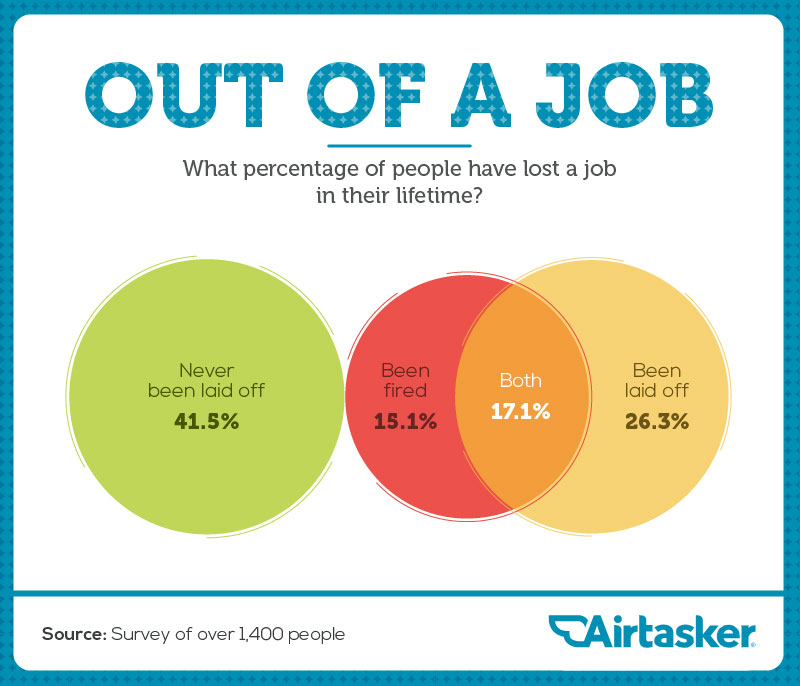
For starters, almost 44% of respondents said they’ve been laid off before. According to CNN, over 2.5 million jobs were lost in 2008 alone due to the economic recession; the unemployment number topped off around 7% – the highest rate since 1993. If you felt the burn then, you’re probably pushing those memories into the deepest recesses of your brain right about now.
To put those numbers into perspective, the U.S. Department of Labor shared, “the 2.6 million jobs lost in 2008 nationwide were equal to the number of jobs found in states such as Wisconsin, Missouri or Maryland.”
What about the other kind of letting go? A little more than 32% of people said they’ve been fired from a job, with over 17% having experienced both kinds of job loss. Even though the percentage of people who’ve never been fired topped off at around 42%, take heart in knowing there are more people who’ve been forced to move on from jobs than those who haven’t.
Reasons matter
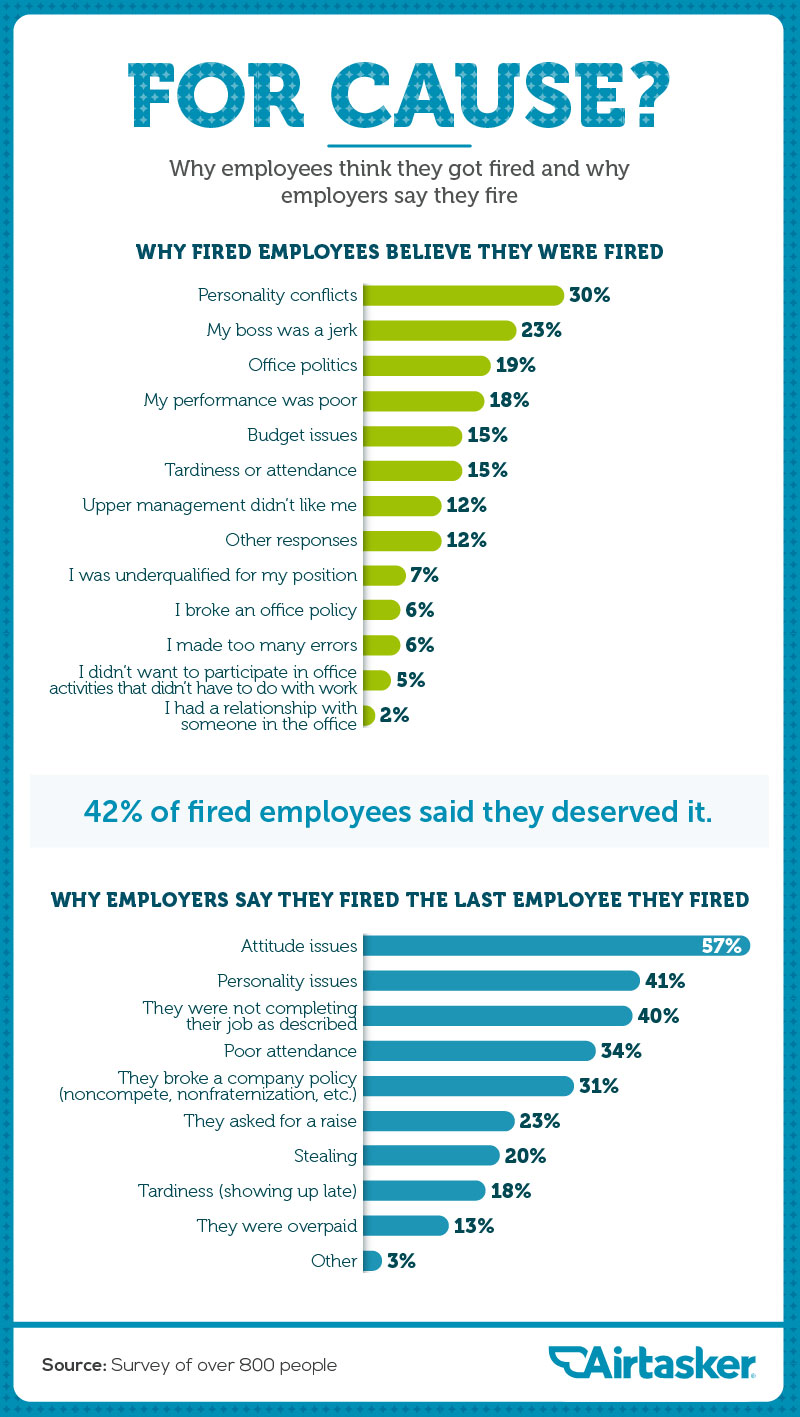
If you’ve been fired, you likely spent some time trying to figure out the reason. The people we surveyed raised ideas including personality conflicts, unforgiving bosses, poor performance, and timeliness. A bit less than one-third of respondents attributed their firing to personality conflicts, and another 23% cited a mean manager, while others suspected office politics and personal poor performance, at 19% and 18% respectively. Budget issues and tardiness (or outright absence) were common ideas as well, both at 15%.
The issue here lies in the fact that even though 42% of people agreed their firing was justified, their bosses disagreed on many of the main reasons why. According to employers, attitude issues were the No. 1 reason they fired an employee, with 57% citing it as a catalyst, with personality and performance issues following at 41% and 40% respectively.
Employees lacking in productivity or making lousy decisions are often the first ones to go. Becoming overly involved in office politics and inadequate time management skills can also cause concern among managers.
Your future isn’t over
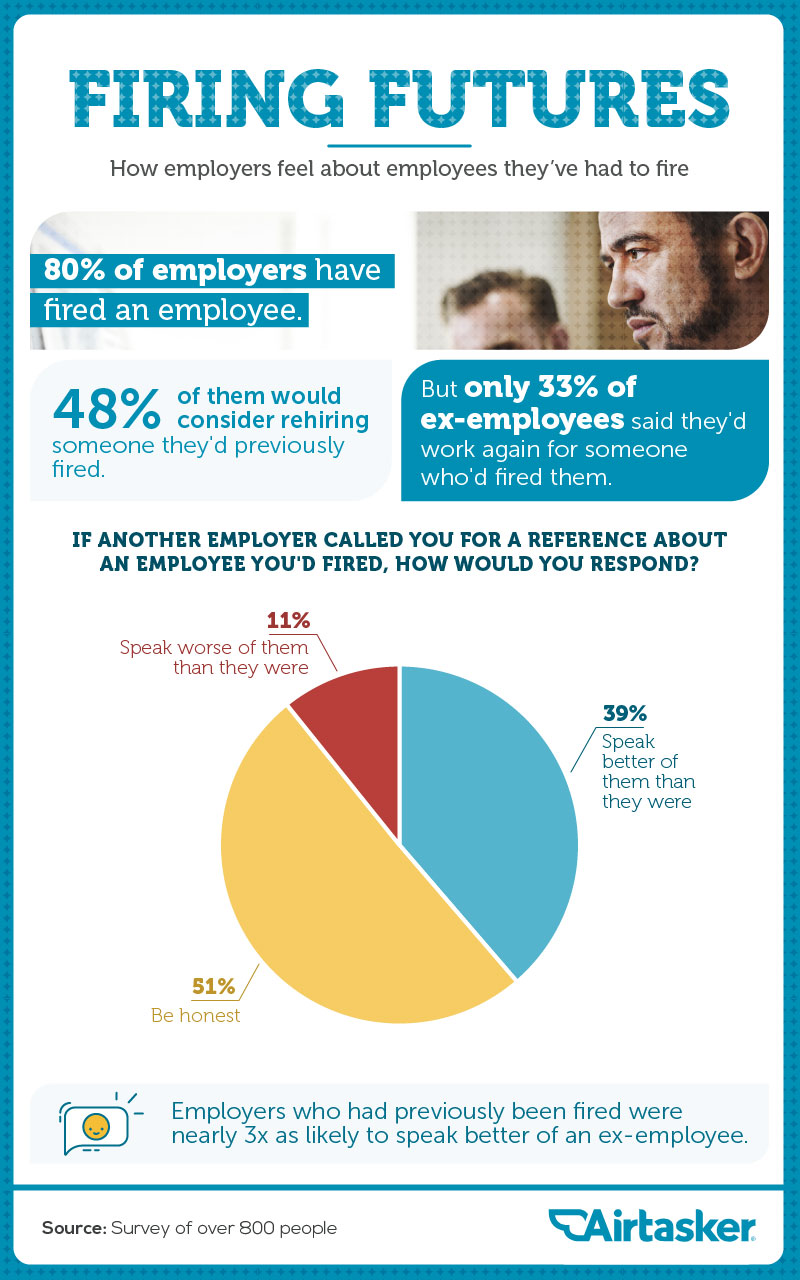
Of the 1,420 people we surveyed, 93 of them were employers who are currently responsible for hiring and firing personnel. Eighty percent of these employers said they’ve fired someone. Additionally, 48% of people in the power seat said they’d consider rehiring someone they had previously fired. Still, only 33% of employees would consider working for a former boss.
At the end of the day, more than half of the employers we surveyed indicated they’d speak honestly of a former employee if called upon as a reference. In fact, 39% said they would talk better of someone than they actually had been. This is often for three reasons: They want you to get a new job, they don’t want to deal with the legality of refusing a reference, and they often give leniency to people they know.
This may also come down to the fact that many people have been fired before, including employers. People are more likely to show understanding when they’ve experienced the same situation, so employers who’ve been fired themselves may be more likely to provide a positive reference for a former employee.
Spot the red flags
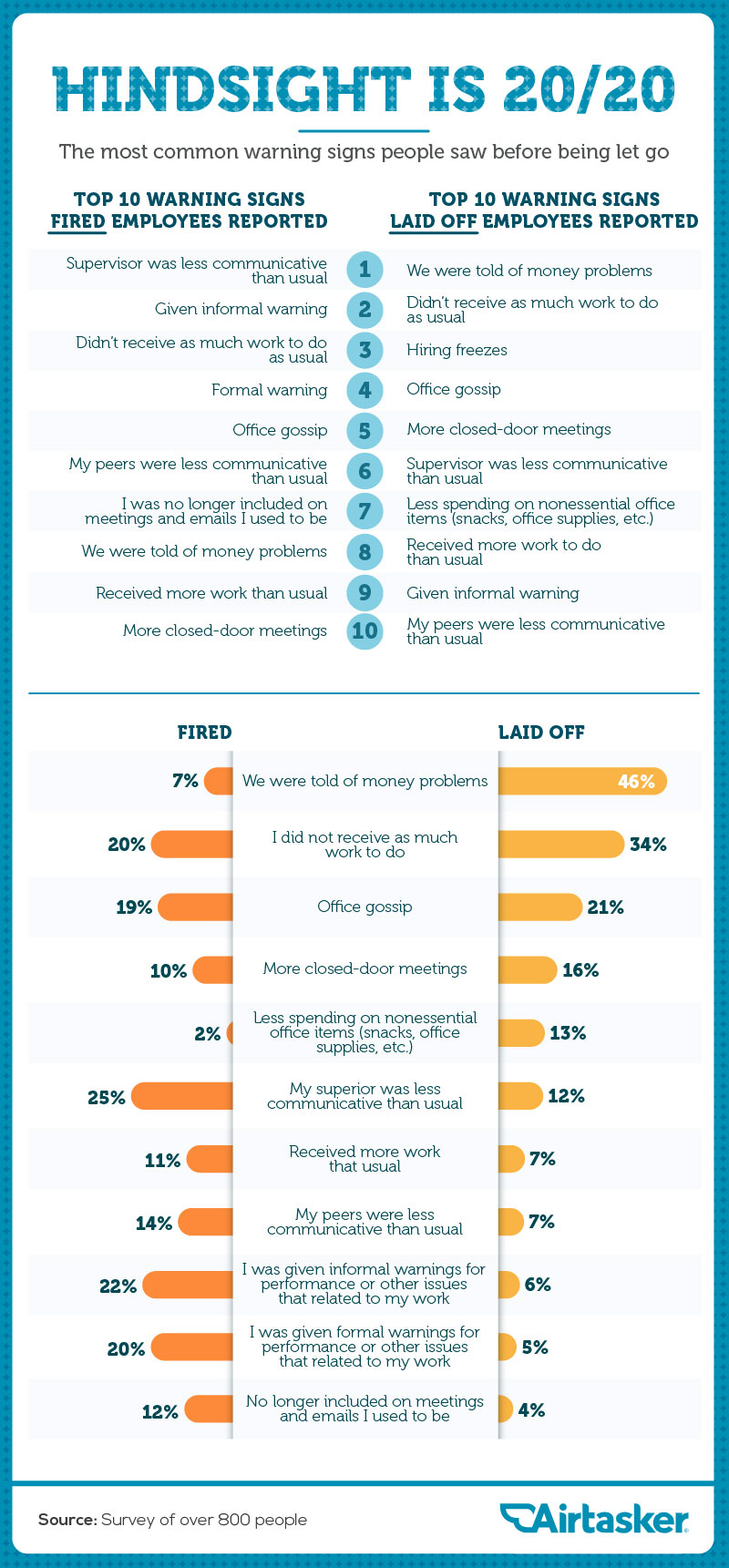
If you suspect you may be in the hot seat, take advice from those before you and heed these red flags. Respondents who were fired were more likely to notice decreased communication from their manager or team. They were also said to have been given less responsibility and had received a warning, informal or otherwise, from their boss prior to their firing.
People who were laid off noticed certain red flags more consistently than those who were fired; 46% of employees in the laid-off category communicated seeing money problems much more than the other nine signs, but people who were fired noticed informal or formal warnings and communication issues more evenly across the 11 signs mentioned.
The aftermath
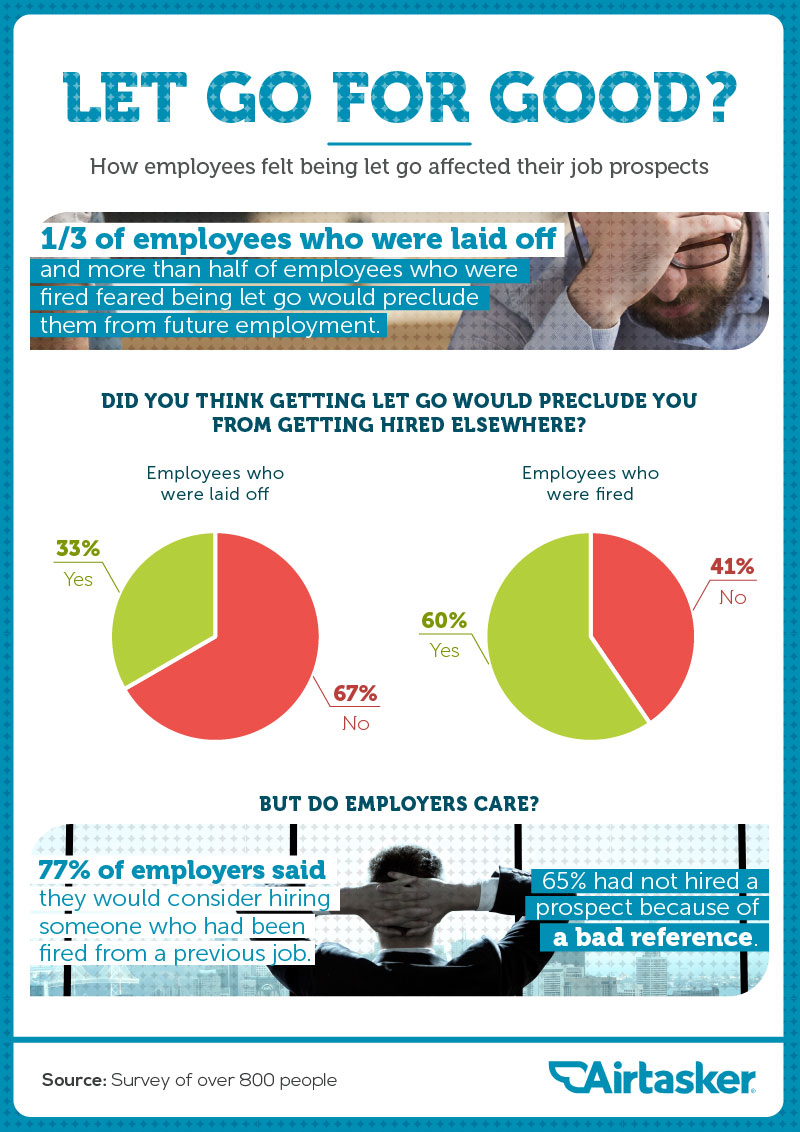
Depending on whether they were fired or laid off, the people we interviewed said their employment predicament left them with varying feelings and degrees of nervousness about the future. Many feared their job loss would prevent them from attaining another job were they to apply for one. Only 33% of employees who were laid off thought their situation might prevent them from future positions, compared to 60% of those who were fired.
On the other hand, employers spoke of a different perspective. They seemed to care more about positive references. References spoke more of a prospect than anything else. In fact, 77% of employers said they would hire a prospective employee with a firing in their job history, while 65% said they passed on a hire because of a poor reference.
Of course, every person’s experience in the job interim will be different, and some employers will be more stringent than others on certain aspects of your work history. A Forbes advice columnist suggests employers who refuse to consider a prospect that’s previously been fired fail to see the big picture: How someone comes into or leaves a job is their business alone; it doesn’t automatically disqualify him or her from success at another company. Inc. reports similar findings. Some jobs simply are not a good fit for an employer or employee and all people grow and learn through these experiences. That’s what matters the most.
Recovery is a process
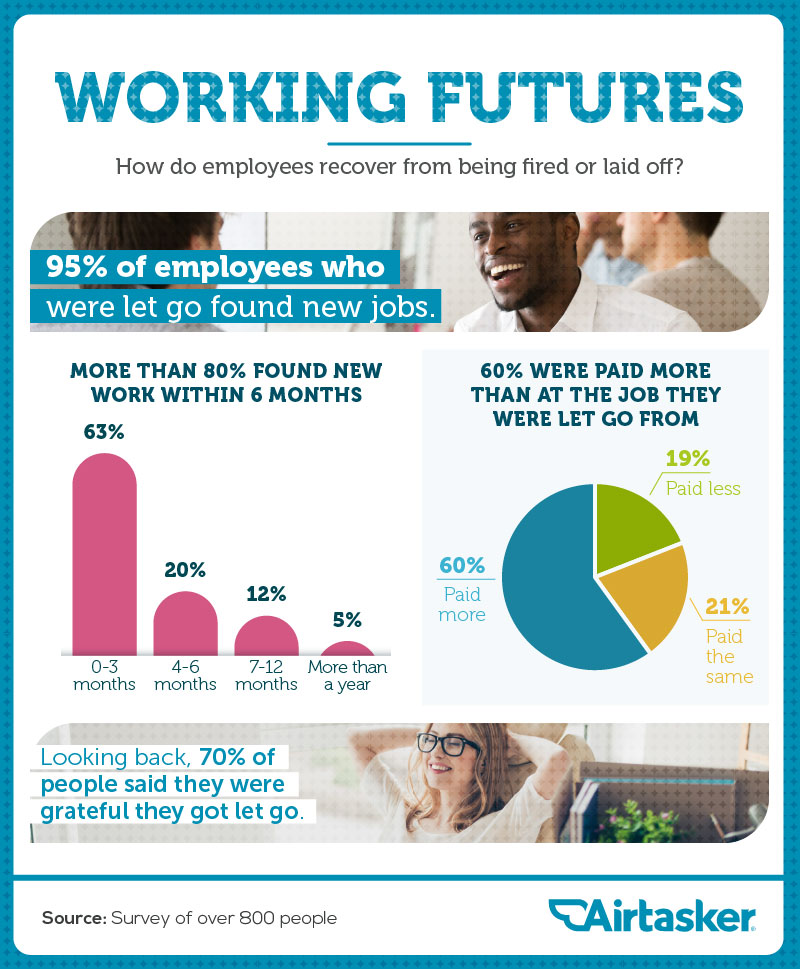
So you’re in between jobs … now what? Our survey found that for most, you don’t have a huge reason to worry.
More than 80% of the people we spoke with found another job within six months, with 63% of people who have been let go or fired finding new work within the first three. Only 17% of respondents said it took more than 6 months to find work. Financially, our respondents reported benefits too: 60% said that at their next job, they saw an increase in income.
And while the experience can be stressful, most of our respondents saw silver lining. A whopping 70% of all people who had been let go from a job said that today, they feel grateful for being let go.
Manage that stress
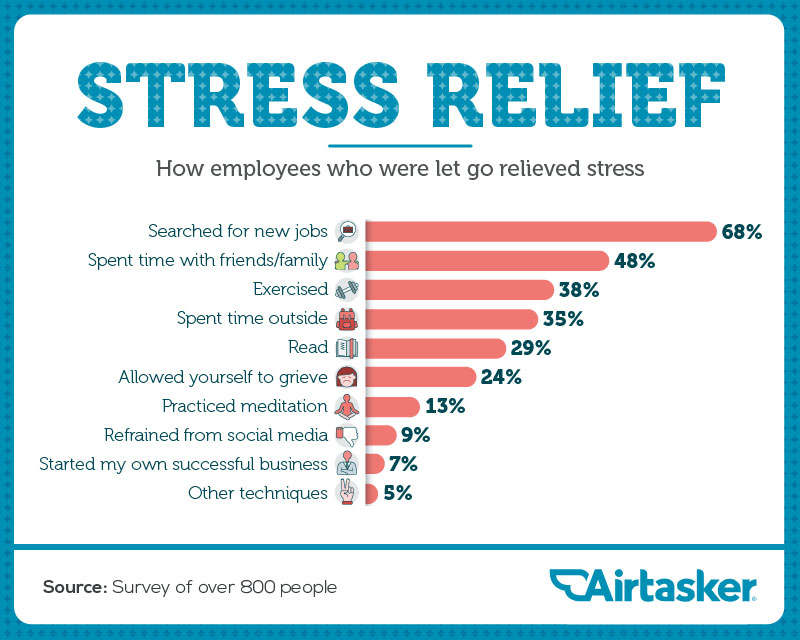
While hindsight may be 20/20, anyway you cut it, getting let go is stressful. We wanted to find out what tips people had for managing that stress. A large portion of respondents (68%) said they searched for jobs to help reduce stress after being let go. They likely felt the need to be proactive while coping with the loss of a time-consuming obligation.
Tap into your talents
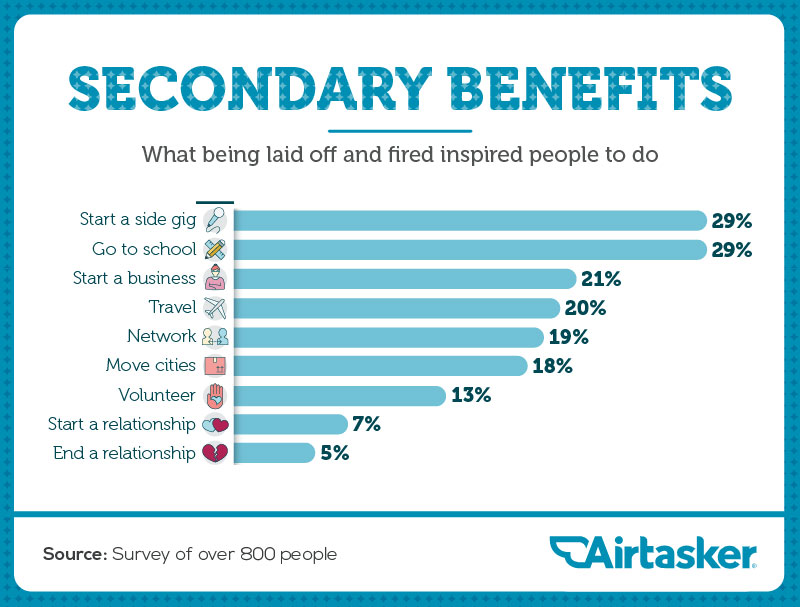
Just because you’ve been fired or laid off doesn’t mean you’re horrible at your job. You have dreams and aspirations that probably have been hiding away for years because of a draining 9 to 5. You have skills and talents that may not have seen the light of day in 10 years, either. And while losing your job can feel like the end of the world, it certainly does not have to. In time, it can help you realize all of these lost facets of yourself!
We mentioned that 70% of people were grateful today for being let go in the past, so why might that be? We asked people what being let go inspired them to do. Our top answer? Twenty-nine percent of respondents said their job loss inspired them to start a side gig. What kind? Well, they can look like anything. An equal number said it inspired them to go back to school, and more than 1 in 5 said it inspired them to start a business.
Finding your own path
Just like some people dread starting a new job, many dread ending said jobs, too. It is often humiliating to get fired and daunting to be laid off, especially in a struggling economy. The good news is, those uncontrollable pitfalls do not have to define your life. Chances are high you’ll find a new job, even if you’ve been fired, and you can join millions of other people in the employment revolving doors. Renew your passions, find new hobbies, tap into your talents, and let Airtasker be that networking guru in your job corner.
Methodology and limitations
To compile the data shown above, we surveyed 1,420 currently or formerly employed people about their employment histories. Of the 1,420, we surveyed 831 people who had lost a job at some point and 93 employers who were currently responsible for hiring and firing. Sixty-four of those employers had previously been let go from a job. For people who were let go multiple times or had fired multiple people, we asked them to think of only their most recent time while answering our questions. We asked each of the groups questions about being let go or letting people go, and respondents were only asked to answer questions for which their circumstances applied (for instance, people without hiring/firing power were not asked whether they’d hire certain types of people). The respondent pool was 56% male and 44% female, with less than 1% choosing a different option.
Because the data presented come from a survey, they may contain some methodological biases common to any survey, such as recency bias, telescoping, and other self-report issues. In all cases, we attempted to present the data without bias. Additionally, because survey respondents were paid, we understand there might be other biases or leanings with respect to employment.
Fair use statement
Feeling optimistic about the future and want to share? We encourage you to post or share any of the information above anywhere you choose for noncommercial purposes, but we ask that when you do, you cite the authors and link back to this page.



